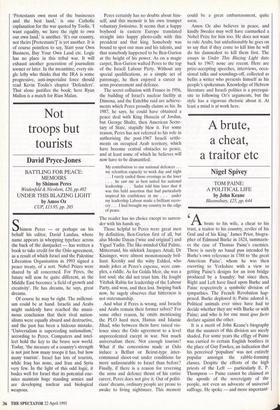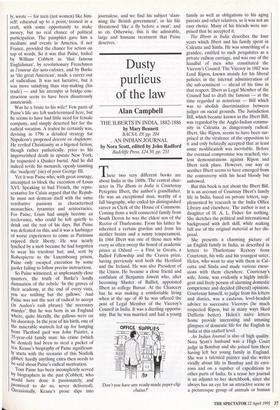A brute, a cheat, a traitor etc
Nigel Spivey
TOM PAINE: A POLITICAL LIFE by John Keane Bloomsbury, £25, pp. 644 Abrute to his wife, a cheat to his trust, a traitor to his country, reviler of his God and of his King.' James Prior, biogra- pher of Edmund Burke in 1824, summaris- es the case of Thomas Paine's enemies. There is surely no banal pun intended by Burke's own reference in 1788 to 'the great American Paine', whom he was then escorting to Yorkshire with a view to getting Paine's designs for an iron bridge produced by a foundry; but since then, Right and Left have fixed upon Burke and Paine respectively a symbolic division of sympathies. The French Revolution hap- pened. Burke deplored it; Paine adored it. Political animals ever since have had to decide whether they are with Burke or with Paine; and who is for one must ipso facto declare against the other.
It is a merit of John Keane's biography that the nuances of this division are nicely shaded. For some years the effigy of Paine was carried to certain English bonfires in the place of Guy Fawkes, an indication that his perceived 'populism' was not entirely popular amongst the rabble-forming classes. Despite the efforts of the high priests of the Left — particularly E. P. Thompson — Paine cannot be claimed as the apostle of the sovereignty of the people, not even an advocate of universal suffrage. He spoke — and more important- ly, wrote — for men (not women) like him- self: educated up to a point,• trained in a craft, with some opportunity to make money, but no real chance of political participation. The pamphlet gave him a medium: and events in America, if not France; provided the chance for action on top of words. So it was that Paine, hailed by William Cobbett as 'that famous Englishman', by revolutionary Frenchmen as l'orateur des sans-culottes, and by Burke as 'the great American', made a career out of radicalism. It was not lucrative, but it was more satisfying than stay-making (his trade) — and his attempts at bridge con- struction seem to have been disastrously amateurish.
Was he a brute to his wife? Few parts of Paine's life are left undetermined here, but he seems to have had little need for female company, and simply deserted her for the radical vocation. A traitor he certainly was, devising in 1796 a detailed strategy for Napoleon's proposed descent en Angleterre. He reviled Christianity as a bigoted fiction, though rather pathetically, prior to his impoverished death in upstate New York, he requested a Quaker burial. And he did indeed revile his monarch, openly taunting the `madjesty' (sic) of poor George III.
Yet it was Paine who, with great courage, attempted to block the execution of Louis XVI. Speaking in bad French, the repre- sentative for Calais argued that the Repub- lic must not demean itself with the same retributive passions as characterised monarchies, tyrannies and aristocracies. For Paine, Louis had simply become an irrelevance, who could be left quietly to drink out the rest of his days. But Paine was defeated on this, and it was a harbinger of worse experiences to come as Parisians enjoyed their liberty. He was nearly lynched by a mob because he had forgotten to wear his tricolour hat; and, sent by Robespierre to the Luxembourg prison, Paine only escaped execution by some gaoler failing to follow precise instructions.
So Paine witnessed, at unpleasantly close quarters, the truth of Burke's lordly damnation of the rebels: 'In the groves of their academy, at the end of every vista, you see nothing but the gallows.' And Paine was not the sort of radical to accept (in Auden's rash phrase) 'the necessary murder'. But he was born in an England where, quite literally, the gallows were on his doorstep. In the year of his birth, one of the miserable wastrels led up for hanging from Thetford gaol was John Painter, a 35-year-old family man: his crime (which he denied) had been to steal a packet of tea. Keane's biography of Paine significant- ly starts with the scenario of this Norfolk gibbet: hardly anything extra then needs to be said about Paine's radical motivation.
Tom Paine has been incompletely served by biographers in the past (Cobbett, who would have done it passionately, and promised to do so, never delivered). Occasionally, Keane's prose slips into journalese, and we find his subject 'slam- ming the British government', or his life threatened 'like a fly before a swat', and so on. Otherwise, this is the admirable, large and humane treatment that Paine deserves.



























































 Previous page
Previous page